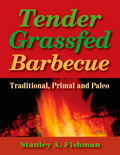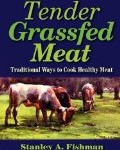Our Ancestors Did Not Eat Spoiled Meat—Traditional Meat Preservation
By Stanley A. Fishman, author of Tender Grassfed Meat and Tender Grassfed Barbecue
Our modern culture is very arrogant. We are taught that our culture is much more advanced, scientific, and knowledgeable in every area of life than our ancestors. This arrogance often leads to misinformation being taught as truth.
We are told that our ancestors ate spoiled meat, and wanted spices to hide the foul taste. Not true. Our ancestors had many effective ways of preserving meat, which did not use toxic chemicals and preservatives, and which preserved the nutritional value of the food, and sometimes increased it.
The Myth
When I was in school, even college, we were taught that our ancestors ate spoiled meat, because they did not have refrigerators or freezers. Furthermore, we were told that our ancestors craved spices to hide the taste of spoiled meat.
This is simply not true. While our ancestors might eat spoiled meat under extreme circumstances (such as being on a ship, far out to sea, when the salted meat started to spoil), this was very unusual. You also cannot hide the taste of truly spoiled meat with spices, though many spices can help preserve meat, and keep insects away.
The Truth
Our ancestors had traditional ways of preserving meat, going back to ancient times and beyond. When they killed an animal for food, some or all of it would be eaten fresh, but that which was not eaten was preserved, with methods that could last for months or even years. The most common methods included:
- Salting
- Drying
- Smoking
- Fermenting
Often, several of these methods were used to preserve a particular piece of meat. Hams, for instance, were often salted, smoked, and dried. Bacon was salted and smoked. Sausages were often smoked, salted, and fermented.
There were many other methods used as well. The ancient Romans and Greeks often preserved meat and fish by submerging them in olive oil. Meat was often preserved by cooking it in a large amount of fat, than covering it with fat and sealing it in a container. Traditional French confit uses this method. In cold climates, ice was cut into blocks and placed in cellars or caves to preserve meat. In some cold areas, meat was wrapped in hides and placed in the very cold soil, which would completely freeze during the winter. The meat was dug up and eaten when the soil had thawed.
Another method was to dry meat in the sun, then pound it into a paste with fat and some kind of fruit. The famous Pemmican of the Native Americans was preserved in this manner.
These methods required skill and knowledge to be done effectively. They did not keep the food preserved indefinitely, but they did preserve the food for a while. And many would consider them to be preferable to modern methods, such as chemical preservatives and irradiation.
Our ancestors did not eat spoiled meat. They knew how to preserve it.
Disclaimer: Information found on the Tender Grassfed Meat site, including this article, is meant for educational and informational purposes only. Any statements or claims about the possible health benefits conferred by any foods or anything else have not been evaluated by the Food & Drug Administration and are not intended to diagnose, treat, cure, or prevent any disease. None of the content on the Tender Grassfed Meat site should be relied upon for any purpose, and nothing here is a substitute for a medical diagnosis or medical treatment.
This post is part of Fat Tuesday, Real Food Wednesday and Fight Back Friday blog carnivals.


 Photos of recipes from the new book Tender Grassfed Barbecue
Photos of recipes from the new book Tender Grassfed Barbecue
 Photos of recipes from the cookbook Tender Grassfed Meat
Photos of recipes from the cookbook Tender Grassfed Meat
